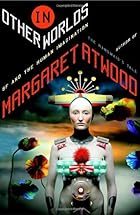In Other Worlds: SF and the Human Imagination is a collection of essays by Margaret Atwood based loosely on the theme of science-fiction. Because they cover a broad variety of subjects and are taken from her writings and lectures over the past several decades, they are rather disjointed, and occasionally, there is some repetition of ideas.
I enjoyed in particular Atwood’s reflections on her own novel The Handmaid’s Tale and the controversy it has spawned since its publication in 1985, as well as her thoughts on 1984, Brave New World and Never Let Me Go. I also liked her sentimental yet analytical look at comic books, which made up a large part of her childhood reading, as they did my own.
People I know seem to either love or hate Atwood’s work. I belong in the former category, and I frequently find her observations clever and thought-provoking. If you’re not an Atwood fan already, I’d suggest giving this collection a miss, as there may be too many personal reminiscences to be of interest. However, if you’ve enjoyed her novels and essays, then this book is worth a read.
Monday, July 30, 2012
Tuesday, July 3, 2012
Among Others by Jo Walton
For the first time ever, I joined WorldCon as a supporting member and consequently got access to their Voter Packet. An amazingly good deal for only $50, the packet includes downloads of almost all the nominated works. Included was Jo Walton’s Among Others, a nominee in the best-novel category. Walton is a Welsh-Canadian author who makes her home in Montreal.
I liked this book very much but thought that it was an unusual choice for a Hugo nomination. First, it is not in any way a science-fiction novel; rather it is about science fiction. Throughout the book, the main character Mor comments on the novels (mostly but not all from the sci-fi and fantasy genres) she has read and is reading. Indeed, the novel seems very much Walton’s fond and nostalgic inventory of all the novels she herself had read as a youth. This may all be too much for readers who are not fans of sci-fi, but given that I’d also spent many hours as a teenager devouring many of the same books, I found the commentary quite enjoyable.
It’s also questionable whether this could be called a fantasy novel. Certainly, Mor talks about fairies and magic, and she calls her mother a witch. However, it is not always clear what is real in the context of the novel and what is a product of Mor’s imagination. She even wonders herself if certain events that had happened were caused by magic or simply events that would have occurred in any case.
However you want to classify this book, it is a lovely coming-of-age story. Through her passion for sci-fi and fantasy, Mor, who had always felt like she did not fit into the world, finds like-minded people who care about what she has to say. She also starts to build a bond with her estranged father through their shared interest in books. In addition, this novel pays tribute to libraries and librarians, and as a lifelong user of libraries, how could I not love that?
I liked this book very much but thought that it was an unusual choice for a Hugo nomination. First, it is not in any way a science-fiction novel; rather it is about science fiction. Throughout the book, the main character Mor comments on the novels (mostly but not all from the sci-fi and fantasy genres) she has read and is reading. Indeed, the novel seems very much Walton’s fond and nostalgic inventory of all the novels she herself had read as a youth. This may all be too much for readers who are not fans of sci-fi, but given that I’d also spent many hours as a teenager devouring many of the same books, I found the commentary quite enjoyable.
It’s also questionable whether this could be called a fantasy novel. Certainly, Mor talks about fairies and magic, and she calls her mother a witch. However, it is not always clear what is real in the context of the novel and what is a product of Mor’s imagination. She even wonders herself if certain events that had happened were caused by magic or simply events that would have occurred in any case.
However you want to classify this book, it is a lovely coming-of-age story. Through her passion for sci-fi and fantasy, Mor, who had always felt like she did not fit into the world, finds like-minded people who care about what she has to say. She also starts to build a bond with her estranged father through their shared interest in books. In addition, this novel pays tribute to libraries and librarians, and as a lifelong user of libraries, how could I not love that?
Subscribe to:
Posts (Atom)

